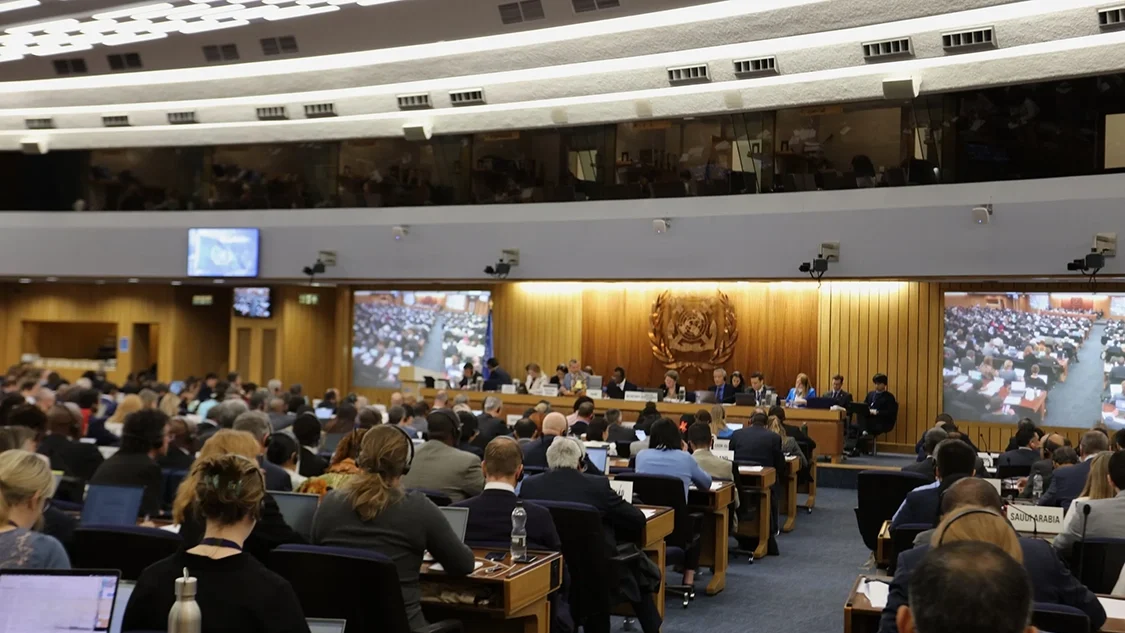The International Maritime Organization (IMO) wrapped up its MEPC 83 negotiations last month with the historical approval of the ‘IMO Net-Zero Framework’. The IMO Net-Zero Framework is a draft regulation that sets out the details of a ‘basket of mid-term measures’ that will be used to decarbonise international shipping. It combines technical and economic elements under a ‘two-tiered global fuel standard (GFS)’.
The framework sets binding emissions reduction targets for ships and requires a penalty payment for those who can’t meet the targets (meaning there is pricing on some emissions, but not all). It also includes a reward mechanism for ships using zero or near-zero (ZNZ) greenhouse gas (GHG) emission technology and fuels. If you want to learn more about how it works, read our IMO Net-Zero Framework factsheet.
On paper, this might sound like a grand deal in the greater scheme of the climate movement (a historic step towards binding emissions reduction measures for a high-emitting sector). But in reality, we, along with many others, are disappointed with this outcome. The measures fall short of what could have been a major step towards a just and equitable transition in maritime shipping decarbonisation, failing to reach the aspiration shared by many climate vulnerable countries worldwide.
So where does the IMO Net-Zero Framework fail to deliver for a just and equitable transition? Here are five key areas where the IMO lacked ambition:
1. It’s a far cry from shipping’s net-zero climate targets
Just two years ago, the IMO adopted the 2023 Revised Strategy, setting a goal to reduce GHG emissions from international shipping to reach net zero by 2050. They established additional targets for total annual reduction of GHG emissions by at least 20%, striving for 30% by 2030, and a further 70%, striving for 80% by 2040.
The recent MEPC 83 outcome, however, would not come close to reaching this goal.
As it stands now, the mechanism agreed is far too weak to incentivise ships to transition away from fossil fuels and towards greener alternatives at the pace needed. According to a readout by UCL Shipping and Oceans Research Group, the new regulations would see emissions fall by 10% by 2030 – which is far below the 30% ambition of the IMO 2023 Strategy, let alone a 1.5ºC trajectory, and hence would completely undermine the Organization’s commitment to net zero.
2. Low ambition prices mean limited revenues to drive climate justice
Some may celebrate the approval of the world’s very first price on the shipping industry’s GHG emissions. Yet, in reality, these prices – and the limited portion of emissions they can be applied to – are far from being sufficient. And especially compared to the universal, high-priced levy initially championed by climate vulnerable countries.
The IMO Net-Zero Framework’s pricing mechanism will only cover a small portion of international shipping’s GHG emissions. The UCL Shipping and Oceans Research Group has predicted that the revenues collected will reach approximately $11-12bn. This sum would not be enough to ensure a just and equitable transition – for example, by limiting support for capacity building in developing countries. It would also fall short of spurring the very crucial global uptake of zero and near-zero fuels technologies and energy sources that is essential to the green transition and decarbonisation of the sector.
3. Risk of shipping paying to pollute
Not only will the low prices generate insufficient revenues for change, but they will also fail to incentivise shipping companies to transition to greener alternatives.
These companies might adopt the new cost into their operations instead of seeking for alternatives. In other words, they would ‘pay to pollute’ and continue business as usual rather than make efforts to transition to zero or near-zero fuels and technology.
4. It doesn’t support the fuels we need to transition
The agreement does not provide ample support to encourage the uptake of renewable hydrogen e-fuels at the pace needed. This could potentially push ships towards the use of harmful biofuels instead, which could prove disastrous to both the industry and environment.
Biofuels pose a great threat to biodiversity, as highlighted in our latest biodiversity report. Their production and transport also generate substantial emissions. It’s urgent that countries push for stronger Life-Cycle Assessment (LCA) Guidelines that would label which fuels are truly ‘clean’. Green hydrogen is a key solution for the sector to reach net zero without harming biodiversity. But the measures agreed have not done enough to encourage its expansion.
5. Lack of transparency and fairness towards climate vulnerable countries
Many climate vulnerable countries have expressed their disappointment with both the outcome and its execution.
Several leaders and negotiators from the Pacific Island, African, Caribbean and Central American states spoke out, highlighting how the agreement has failed to meet the goals of the 2023 strategy and the needs of those most affected by climate change.
Concerns have also been raised about the lack of transparency in the outcome’s formulation, particularly by Small Island Developing States (SIDS) and Least Developed Countries (LDCs), despite their position as some of the most disproportionately impacted by climate change and their consistent advocacy for inclusivity and ambition. In the end, many climate vulnerable countries chose to abstain from the final vote in protest of how the negotiations were conducted.
Although the measures have been approved, the work is far from over. Now more than ever, states must champion greater ambition and address the damage already done. Opportunity Green will continue to push for ambition and amplify the voices of those most impacted by climate change, ensuring no one is left behind.
Find out more about our work at the IMO and read our guide to the IMO Net-Zero Framework.

